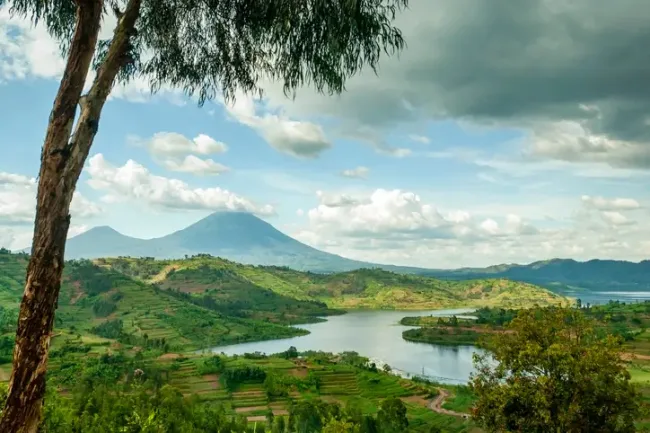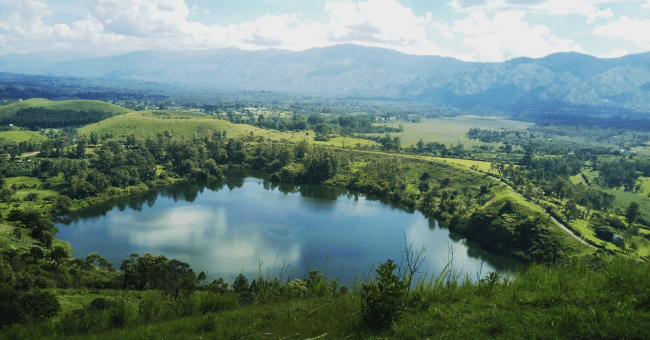
Welcome to Uganda
Traveling to Uganda? You may need a visa – find out if you do, which type, and how to apply so you can get the paperwork out of the way and focus on your trip.

What’s a Uganda Tourist Visa and who’s it for?
Who’s the Uganda Tourist Visa for?
The Uganda Visa opens doors for travelers from most countries. Check your eligibility here and apply instantly online!
Who isn't eligible for the Uganda Tourist Visa? Specific individuals are visa-exempt for Uganda or need a different visa to enter the country. These include:
-
Holders of non-citizen passports, certificates of identity, or other travel documents, including a Titre de Voyage.
-
Those possessing a British National Overseas (BNO), British Dependent Territories Citizen, British Overseas Citizen, British Protected Person, or British Subject passport.
What’s the purpose of the Uganda Tourist Visa? Tourism and business.
How long can you stay with the Uganda Tourist Visa? It’s valid for a Single entry into Uganda and permits a stay of up to 90 days.
What’s a Uganda East Africa Visa and who’s it for?
Who’s the Uganda East Africa Visa for?
Travelers who want to travel to Uganda, Kenya, and Rwanda on one trip.
Who isn't eligible for the Uganda East Africa Visa? If you’re just traveling to Uganda on your trip, apply for the Uganda Tourist Visa instead.
What’s the purpose of the Uganda East Africa Visa? Tourism.
How long can you stay with the Uganda East Africa Visa? This is a Multiple entry official travel document. You’re allowed to travel between these countries as much as you want for up to 90 days in total.
What’s a Uganda Transit eVisa and who’s it for?

Who’s the Uganda Transit eVisa for?
Travelers who must pass through Uganda en route to another destination, require a visa, and plan to stay for up to two days only.
Who isn't eligible for the Uganda Transit eVisa?
Those who want to visit Uganda for more than two days for tourism, business, or other reasons.
What’s the purpose of the Uganda Transit eVisa?
The Transit eVisa for Uganda is tailored for brief layovers or connections, or leaving the airport on your way to another destination.
How long can you stay with the Uganda Transit eVisa? You’re allowed to take two days to complete your transit. It’s a Single entry visa.
What are Uganda's other short- and long-term visa options?
As a traveler in Uganda, it's important to be aware of the health standards and considerations to ensure a safe and healthy trip. Here are some common long-term visas:
-
Business Visa: Designed for individuals visiting Uganda for business-related activities like meetings, conferences, or exploring business opportunities.
-
Conference Visa: Issued to those attending conferences, seminars, or workshops in Uganda, usually for a short duration.
-
Family Visit Visa: For people who wish to visit family members residing in Uganda, suitable for short-term family reunions or visits.
-
Work Visa: For individuals who intend to take up employment in Uganda.
-
Investor Visa: Specifically for investors starting or managing businesses in Uganda.
-
Dependent Pass: For family members of those holding work or investor visas.
-
Student Visa: For those pursuing long-term education in Uganda.
-
Special Pass: A temporary solution for those who need to stay longer than their current visa allows, often used during the processing of work or dependent passes.
At iVisa, we currently don’t offer these visas, but you can find out more from the nearest Ugandan Embassy or Consulate.
Staying healthy in Uganda: Here’s what you need to know
Keep your journey to Uganda worry-free by staying aware of essential health guidelines. Here's what travelers should know.
Make sure to stay updated on routine vaccines
-
A Yellow Fever vaccination certificate is required for all travelers over one year.
-
Common recommendations include Hepatitis A & B, Rabies, Typhoid, Meningitis, Chickenpox, Diphtheria-Tetanus-Pertussis, Flu, Measles-Mumps-Rubella (MMR), Polio, and Shingles.
-
Keep updated with Uganda's COVID-19 requirements, such as quarantine, testing, or vaccine certificates, through your airline or the Uganda government website.
Medical facilities
-
Urban areas have better facilities than rural ones.
-
In more remote areas, healthcare facilities may be less advanced and harder to access.
-
Pharmacies are widely available in urban areas.
Health insurance
We’d always recommend taking out health insurance before you travel anywhere from any destination.
Contact your insurance provider before traveling to ensure you have the right level of coverage.
Other things to consider:
-
Trip cancellation, delay, and interruption benefits.
-
Medical expenses and medical evacuation benefits.
-
Baggage coverage.
Things to be aware of when visiting Uganda
Keep an extra eye on the following to keep healthy and safe during your trip to Uganda:
1. Extreme weather: Be prepared for heavy rains and landslides, particularly during rainy seasons.
2. Traffic: Poor road conditions and regulations present risks. Defensive driving is crucial.
3. Wildlife: Follow guidelines in natural parks and reserves to minimize risks from wildlife.
Medication for personal use
Follow these tips to bring into Uganda some over-the-counter medicines:
-
Declare all medications: Report all medication for personal use to customs authorities.
-
Original packaging: Always keep medicines in their original containers and in transparent bags in your hand luggage.
-
Prescription or doctor's letter: Present the medical prescription issued by your doctor or other competent authority in English.
-
Check for restrictions: Call Uganda's embassy to verify that all of your prescription(s) are legal to bring with you.
-
Quantity aligned with itinerary: Bring only a reasonable quantity that aligns with the duration of your stay to avoid complications.


 India Visa
India Visa
 Turkey Visa
Turkey Visa
 United States Visa
United States Visa
 Australia Visa
Australia Visa
 Colombia Visa
Colombia Visa
 New Zealand Visa
New Zealand Visa
 China Visa
China Visa
 Egypt Visa
Egypt Visa
 Vietnam Visa
Vietnam Visa
 Indonesia Visa
Indonesia Visa


